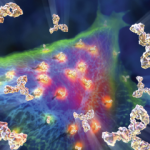As to their hypothesis that the CCP antibodies precede PAD-4 antibodies, the team has now found the answer, but is waiting until the publication of their data before announcing these findings. In additional work since the A&R publication, Dr. Rosen and colleagues have looked at how the PAD-4 molecule is processed and presented to the immune system, and how it is modified in this process. Those findings are also expected to be published soon.
In additional studies, the researchers have sought to understand whether there are T lymphocytes specific for PAD-4, “which are important in finding patients with RA and may be an important driver for antibody response,” Dr. Rosen says. “We have demonstrated that those T cells are in fact present. Currently, we are trying to understand what activates them and how the two processes—the antibody and the T cell—are related.”
The team also hopes to learn if the PAD-4 antibodies appear as early markers before or after disease symptoms are noted. “We’ve had a collaboration with V. Michael Holers, MD, and his group,” Dr. Rosen noted. “From that analysis, it looks like those antibodies may be elaborated early in RA, and in some cases even before the disease symptoms begin. That’s interesting to us.”
In A&R, the Rosen team says their “data confirm that anti-CCP antibodies are found in the majority of patients with RA and are strongly associated with the presence of the shared epitope, but not with the PAD14 susceptibility allele. In contrast, anti-PAD-4 antibodies identify a subgroup of anti-CCP-positive patients that is enriched for the PAD14 susceptibility haplotype and more severe disease.”
Dr. Rosen noted that published studies by others provide support for his team’s work regarding anti-PAD-4 as a highly specific biomarker for the most severe, erosive form of RA.2-5 “There have also been studies showing that levels vary over time, which I think would be an interesting feature of these antibodies,” he says, adding that he and others are analyzing blood work from two large cohorts whose members with RA are being tracked over a long period of time.
Sue Pondrom is a medical journalist based in San Diego.
References
- Harris ML, Darrah E, Lam GK, et al. Association of autoimmunity to peptidyl arginine deiminase type 4 with genotype and disease severity in rheumatoid arthritis. Arthritis Rheum. 2008;58:1958-1967.
- Halvorsen EH, Pollmann S, Gilboe IM, et al. Serum IgG antibodies to peptidylarginine deiminase 4 in rheumatoid arthritis and associations with disease severity. Ann Rheum Dis. 2008; 67:414-417.
- Halvorsen EH, Haavardsholm EA, Pollmann S, et al. Serum IgG antibodies to peptidylarginine deiminase 4 predict radiographic progression in patients with rheumatoid arthritis treated with tumour necrosis factor-alpha blocking agents. Ann Rheum Dis. 2009; 68:249-252.
- Zhao J Zhao Y, He J, Jia R, Li Z. Prevalence and significance of anti-peptidylarginine deiminase 4 antibodies in rheumatoid arthritis. J Rheumatol. 2008;35:969-974.
- Auger I Balandraud N, Rak J, Lambert N, Martin M, Roudier J. New autoantigens in RA: Screening 8268 protein arrays with sera from patients with RA. Ann Rheum Dis. 2009;68:591-594.

